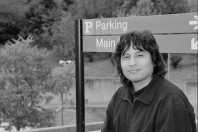Personal tools
News from ICTP 99 - Profile

ICTP associate Jesús Juyumaya is a mathematician who enjoys knotty problems.
Knot a Problem

When Chilean-born ICTP Associate
(1998-2003) Jesús Juyumaya goes to the ICTP library,
he sometimes finds himself tied up in knots--theoretically speaking,
of course. That's because knot theory, a subfield of topology
and algebra that focusses on knot classification and how one knot
may be deformed (a mathematician's way of saying altered) into
another knot, is one of his major areas of research.
Juyumaya was born in Arica, a mid-sized Chilean city of 200,000
people that is located on the Pacific Coast just south of the
Chilean border with Peru. He attributes his interest in mathematics
to his father, a local food and vegetable vendor, who had a passion
for numbers that he shared with his only son. In fact, both Juyumaya's
father and mother encouraged him and his two sisters to earn university
degrees, a dream that hard times had prevented either of his parents
from pursuing.
Today both his sisters are school teachers in their home town.
Juyumaya, however, chose to leave Arica when he was just 17 to
seek a college education at the Catholic University of Valparaíso
in Valparaíso, Chile, some 2000 kilometres away.
"I originally intended to major in physics," notes Juyumaya.
"However, I soon discovered that mathematics could satisfy
my intellectual curiosity just as well and that, quite frankly,
I could grasp mathematical concepts more quickly and easily than
those of physics."
Juyumaya earned his undergraduate degree in 1983 and his master's
degree in mathematics, also from the Catholic University of Valparaíso,
four years later. "By then my aptitude and interests were
firmly set and I decided to immediately apply to the doctorate
programme in mathematics at the University of Chile in the capital
city of Santiago."
The University of Santiago, the largest and most prestigious university
in Chile, has an enrolment of 15,000 students. Yet Juyumaya's
class consisted of just seven students, a select group of math
doctoral students who received personal attention and a great
deal of professorial encouragement during their studies. Juyumaya
took advantage of this opportunity to complete his doctorate in
five years. His major area of study was representation theory
of finite groups, which was a refinement of his master's degree
studies in group and representation theory.
Soon after receiving his doctorate, Juyumaya was appointed a lecturer
at Valparaíso University. He has remained there for the
past decade rising to the rank of professor. "I am fortunate,"
he notes, "to be at Valparaíso because my teaching
load is only two to three courses a year. That leaves plenty of
time for my own research."
His research results have been published, for example, in the
Journal of Algebra and Comptes Rendus de l'Academie
des Sciences Paris. In addition, he has found time to organise
a summer master's programme designed to help high school math
teachers improve their skills in linear algebra, group theory
and calculus, while at the same time learning more about the art
of teaching.
Juyumaya has also been able to travel, most notably to the University
of Paris 7 as a visiting scholar in the late 1990s, and the University
of Warwick in the United Kingdom. In fact, it was in Paris that
he first learned of ICTP's Associate Programme in 1997 from a
wall poster tacked to a board outside his office. He applied the
same year and was accepted on his first try.
"ICTP has been an important boost to my career," he
notes. "The Centre's stimulating research environment and
excellent library allow me to explore new avenues of inquiry,
including knot theory. Not only does the atmosphere at ICTP help
keep my research fresh and exciting, but it also enables me to
stay abreast with the latest developments in a host of research
areas, enhancing both my own studies and teaching skills."